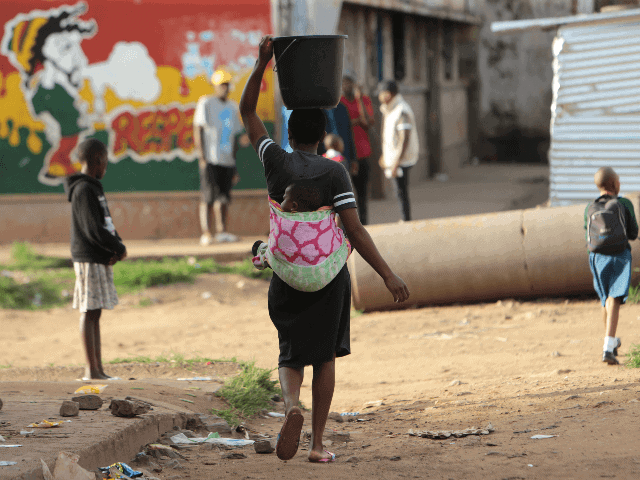Chinese Coronavirus ‘Charity’ Triggering Disgust, Suspicion in Zimbabwe

Zimbabweans have started to voice suspicion of the several coronavirus aid packages China has sent their country in recent weeks, accusing Beijing of using the aid to generate favorable publicity amid a global backlash against the country, Radio France Internationale (RFI) reported on Monday.
Many nations have criticized China for covering up its initial outbreak of the Chinese coronavirus late last year, greatly contributing to its subsequent spread out of the country to the rest of the world. The outbreak has since grown into a full-fledged pandemic responsible for 3,618,325 infections and 253,381 deaths worldwide.
Zimbabwe is connected to China through its Belt and Road Initiative (BRI), a system of infrastructure development China uses across Africa and other parts of the world to establish regional influence. The BRI projects are advertised as lucrative endeavors for host countries when, in reality, they place the developing nations further into debt and force their dependency on China. In the past, China’s aid packages to Zimbabwe have typically been related to this BRI connection.
More recently, China has been donating medical aid – such as personal protective equipment (PPE) and testing kits – as well as large sums of money to Zimbabwe in an outward attempt to help the country combat the coronavirus pandemic. As RFI reported this week, China paid for an upgrade worth $500,000 to the capital’s main coronavirus treatment center. China has employed this new trend of “coronavirus diplomacy,” as critics refer to it, to generate positive publicity for itself, not only in Zimbabwe and Africa, but around the world.
Recently, Zimbabweans have increasingly expressed weariness of China’s self-proclaimed generosity in sending these aid packages, meant to contain a virus that China helped spread around the world.
“It may well be expending more energy on profiling these contributions in the face of bad press relating to its responsibilities around managing and communicating around the initial stages of the [coronavirus] pandemic,” Piers Pigou, a southern Africa consultant with the International Crisis Group, told RFI.
In April, Zimbabwean Foreign Minister Sibusiso Moyo urged citizens not to blame a particular group of people for the origin of the coronavirus, in an obvious attempt to quell criticism of China, RFI reports.
On April 23, Zhao Baogang, the deputy ambassador of China to Zimbabwe, tweeted “[S]anctions harm Zim[babwe] more than COVID-19 [Chinese coronavirus].”
In response, influential Zimbabwean journalist Hopewell Chinono tweeted back, “You think that Zimbabweans are so foolish that they would buy into your pathetic explanations when the whole world knows what is going on?”
“Corruption, Looting, and Chinese pillaging harm Zimbabwe more than anything else,” Chinono added.
“If companies like Huawei were paying taxes, Zimbabwe would not need donations,” he said, referring to a 2014 investment agreement between Huawei and Zimbabwe exempting the Chinese telecom giant from paying taxes in the country.
Last month, Zimbabwean lawyer Alex Magaisa questioned the Chinese ambassador to Zimbabwe’s decision to donate coronavirus medical aid to a foundation run by Zimbabwe’s first lady, Auxillia Mnangagwa, instead of Zimbabwe’s Health Ministry, New Zimbabwe reports.
Magaisa argued that giving urgently needed coronavirus material – including 50,000 masks, 510 protective suits, and 1,000 goggles – to Mnangagwa instead of directly to medical facilities created unnecessary bureaucracy. Magaisa says he believes the donation was a political move to appease President Emmerson Mnangagwa.
“Now they come through a non-state actor [the foundation] when the state entities exist … We can see through the veil. Zimbabweans are not in the 19th century and they certainly aren’t stupid,” said Magaisa.
Zimbabwe’s Deputy Information Minister, Energy Mutodi, recently voiced his frustration with China and “Asian nations” for their role in spreading the coronavirus by eating exotic animals, New Zimbabwe reported. The Chinese government initially said the coronavirus originated in a wet market in Wuhan, China, late last year, where animals such as bats and pangolin are sold for human consumption. While it has since claimed that this was not true, many around the world still consider the wet market a potential origin point for the pandemic.
On April 24, Mutodi said via Twitter that the Zimbabwe government should consider exporting beef to China and Indonesia so that the countries’ citizens would be less inclined to get their protein from exotic animals.
“The consumption of dogs, cats, snakes, bats, monkeys, baboons, and other wildlife in Asia and some parts of Africa has left us all at risk of contracting the COVID-19 [Chinese coronavirus] and Ebola viruses. We hope to up our game on beef exports to China, Indonesia, and others soon,” Mutodi said.
Photo: AP Photo/Tsvangirayi Mukwazhi











